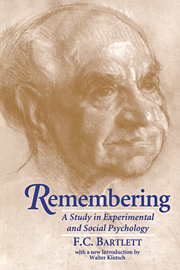Introduction by Walter Kintsch
Published online by Cambridge University Press: 04 August 2010
Summary
If I had to name the three historically most influential publications in the psychological study of memory, I would pick Ebbinghaus's “On Memory” in 1885, Bartlett's Remembering in 1932, and Miller's “Magical Number Seven” in 1956. Miller's paper inaugurated the modern period and the information-processing approach, whereas Ebbinghaus and Bartlett provided the foundations upon which the modern work has been built. How different they were!
Indeed, one can argue that Ebbinghaus and Bartlett are considered our founding fathers precisely because they were so different, each contributing to the study of memory his own distinct perspective. What made the differences in their perspectives important was that they occurred against a shared background of scientific values. Both were empiricists who put their faith in the study of memory through observation and experiment, rather than armchair analysis and speculation, as was the custom before their times. Where they differed was in the types of experiments they conducted and the kinds of observations they valued. Ebbinghaus focused on memory as an object of study; Bartlett was interested in the act of remembering. Although their approaches were contradictory, each made valuable and lasting contributions–a fact that attests to the enormous complexity of memory. There is more to memory than just remembering. Personal experience and general knowledge, reproduction and reconstruction are all aspects of “memory” but require their own methods of study and analysis.
There is no need to dwell on Ebbinghaus's contribution, except in contrast to Bartlett's.
- Type
- Chapter
- Information
- RememberingA Study in Experimental and Social Psychology, pp. xi - xviPublisher: Cambridge University PressPrint publication year: 1995



